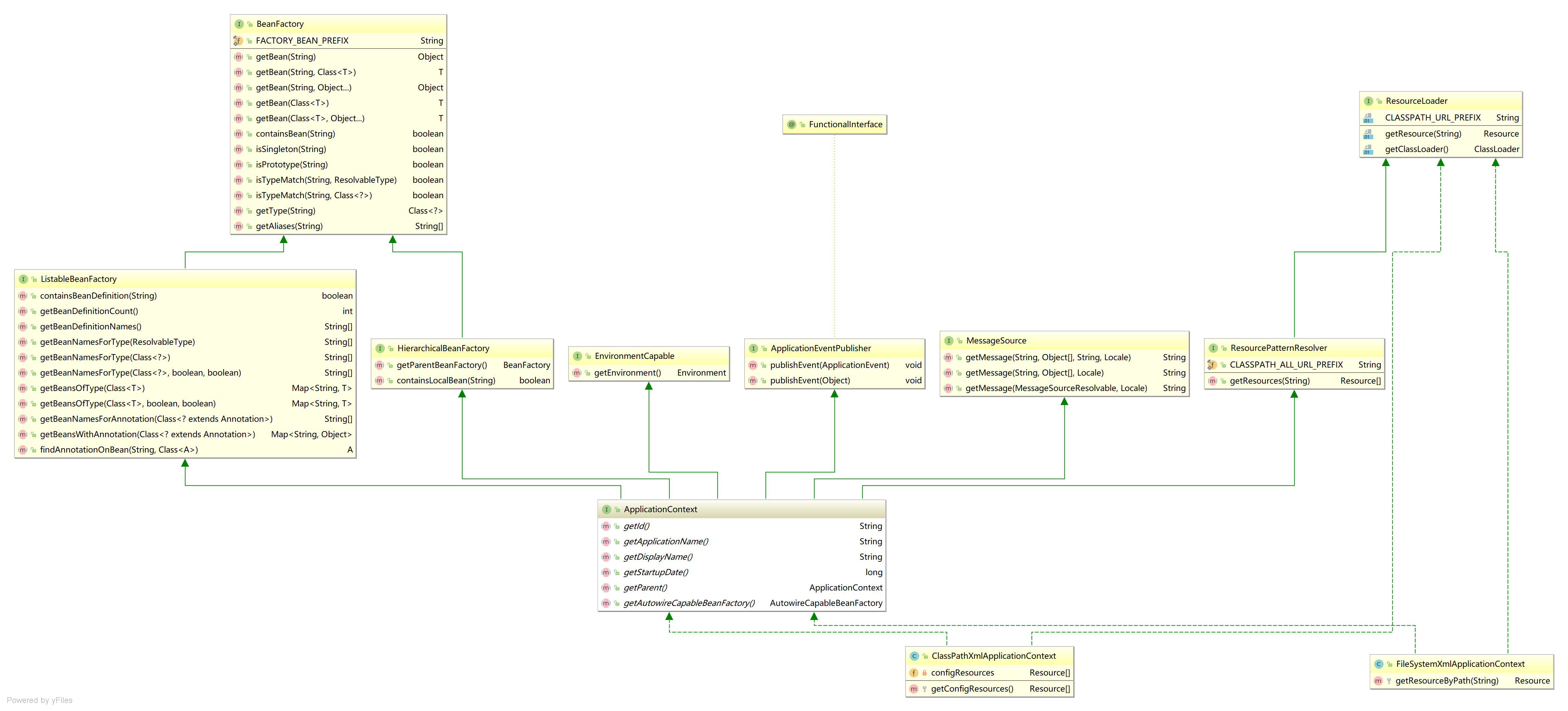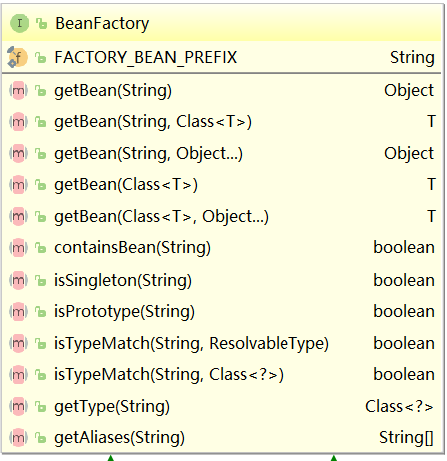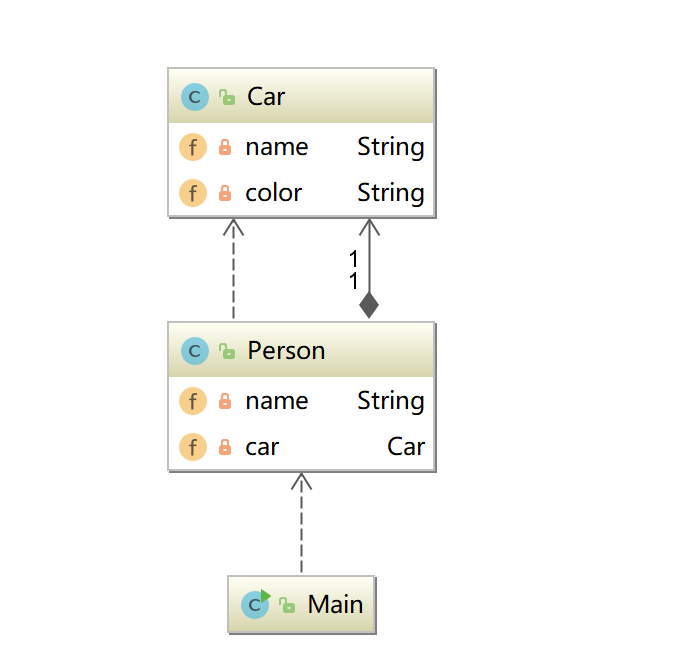创建一个maven工程
在pom.xml 添加spring的依赖
<?xml version="1.0" encoding="UTF-8"?>
<project xmlns="http://maven.apache.org/POM/4.0.0"
xmlns:xsi="http://www.w3.org/2001/XMLSchema-instance"
xsi:schemaLocation="http://maven.apache.org/POM/4.0.0 http://maven.apache.org/xsd/maven-4.0.0.xsd">
<modelVersion>4.0.0</modelVersion>
<groupId>com.softtool</groupId>
<artifactId>spring001</artifactId>
<version>1.0-SNAPSHOT</version>
<dependencies>
<dependency>
<groupId>commons-logging</groupId>
<artifactId>commons-logging</artifactId>
<version>1.2</version>
</dependency>
<dependency>
<groupId>org.springframework</groupId>
<artifactId>spring-beans</artifactId>
<version>5.0.7.RELEASE</version>
</dependency>
<dependency>
<groupId>org.springframework</groupId>
<artifactId>spring-context</artifactId>
<version>5.0.7.RELEASE</version>
</dependency>
<dependency>
<groupId>org.springframework</groupId>
<artifactId>spring-core</artifactId>
<version>5.0.7.RELEASE</version>
</dependency>
<dependency>
<groupId>org.springframework</groupId>
<artifactId>spring-expression</artifactId>
<version>5.0.7.RELEASE</version>
</dependency>
</dependencies>
</project>
创建实体类
package com.softtool;
public class HelloWorld {
private String name;
public HelloWorld(){
}
public HelloWorld(String name) {
this.name = name;
}
public String getName() {
return name;
}
public void setName(String name) {
this.name = name;
}
public void hello() {
System.out.println(name);
}
}
创建一个applicationContext.xml文件
<?xml version="1.0" encoding="UTF-8"?>
<beans xmlns="http://www.springframework.org/schema/beans"
xmlns:xsi="http://www.w3.org/2001/XMLSchema-instance"
xsi:schemaLocation="http://www.springframework.org/schema/beans http://www.springframework.org/schema/beans/spring-beans.xsd">
<bean id="helloWorld" class="com.softtool.HelloWorld">
<property name="name" value="hello world"></property>
</bean>
</beans>
创建测试类
public class Main {
public static void main(String[] args) {
ApplicationContext ac= new ClassPathXmlApplicationContext("applicationContext.xml");
HelloWorld helloWorld = (HelloWorld) ac.getBean("helloWorld");
helloWorld.hello();;
}
}
#运行程序
十一月 02, 2018 9:17:32 下午 org.springframework.context.support.ClassPathXmlApplicationContext prepareRefresh
信息: Refreshing org.springframework.context.support.ClassPathXmlApplicationContext@46ee7fe8: startup date [Fri Nov 02 21:17:32 CST 2018]; root of context hierarchy
十一月 02, 2018 9:17:32 下午 org.springframework.beans.factory.xml.XmlBeanDefinitionReader loadBeanDefinitions
信息: Loading XML bean definitions from class path resource [applicationContext.xml]
hello world
Process finished with exit code 0
运行成功了,控制台中打印出来了hello world
类图

我们看到, ApplicationContext 是一个接口,代表容器,他有两个实现类,一个是ClassPathXmlApplicationContext 一个是FileSystemXmlApplicationContext 我们使用的是ClassPathXmlApplicationContext 从类路径中加载配置文件。
读取类的方法有很多,如下

我们使用
HelloWorld helloWorld = (HelloWorld) ac.getBean("helloWorld");
getBean里的 helloWorld 就是对应applicationContext.xml里配置的helloWorld
这些getBean方法是ApplicationContext继承自BeanFactory
通过构造方法获取
创建两个类
Car
package com.softtool;
public class Car {
private String name;
private String color;
public String getName() {
return name;
}
public void setName(String name) {
this.name = name;
}
public String getColor() {
return color;
}
public void setColor(String color) {
this.color = color;
}
@Override
public String toString() {
return "Car{" +
"name='" + name + '\'' +
", color='" + color + '\'' +
'}';
}
}
Person
package com.softtool;
public class Person {
private String name;
private Car car;
private Integer age;
private Integer value;
public String getRemark() {
return remark;
}
public void setRemark(String remark) {
this.remark = remark;
}
private String remark
;
public Person() {
}
public Integer getAge() {
return age;
}
@Override
public String toString() {
return "Person{" +
"name='" + name + '\'' +
", car=" + car +
", age=" + age +
", value=" + value +
", remark='" + remark + '\'' +
'}';
}
public void setAge(Integer age) {
this.age = age;
}
public Integer getValue() {
return value;
}
public void setValue(Integer value) {
this.value = value;
}
public Person(String name, Car car) {
this.name = name;
this.car = car;
}
public String getName() {
return name;
}
public void setName(String name) {
this.name = name;
}
public Car getCar() {
return car;
}
public void setCar(Car car) {
this.car = car;
}
}
在配置文件中配置
<bean id="car" class="com.softtool.Car">
<property name="name" value="BMW"></property>
<property name="color" value="Red"></property>
</bean>
<bean id="person" class="com.softtool.Person">
<constructor-arg value="wang"></constructor-arg>
<constructor-arg ref="car"></constructor-arg>
</bean>
运行
package com.softtool;
import org.springframework.context.ApplicationContext;
import org.springframework.context.support.ClassPathXmlApplicationContext;
public class Main {
public static void main(String[] args) {
ApplicationContext ac= new ClassPathXmlApplicationContext("applicationContext.xml");
Person person = (Person) ac.getBean("person");
System.out.println(person.toString());
}
}
运行结果
十一月 08, 2018 10:39:33 上午 org.springframework.context.support.ClassPathXmlApplicationContext prepareRefresh
信息: Refreshing org.springframework.context.support.ClassPathXmlApplicationContext@46ee7fe8: startup date [Thu Nov 08 10:39:33 CST 2018]; root of context hierarchy
十一月 08, 2018 10:39:33 上午 org.springframework.beans.factory.xml.XmlBeanDefinitionReader loadBeanDefinitions
信息: Loading XML bean definitions from class path resource [applicationContext.xml]
Person{name='wang', car=Car{name='BMW', color='Red'}, age=null, value=null, remark='null'}
使用内部Bean
在配置文件中配置
<bean id="person2" class="com.softtool.Person">
<property name="name" value="zhangsan"></property>
<property name="age" value="20"></property>
<property name="car">
<bean class="com.softtool.Car">
<property name="name" value="Ben"></property>
<property name="color" value="Blue"></property>
</bean>
</property>
</bean>
测试及程序
Person person2 = (Person) ac.getBean("person2");
System.out.println(person2.toString());
//输出//shPerson{name='zhangsan', car=Car{name='Ben', color='Blue'}, age=20, value=null, remark='null'}
集合属性
测试类
package com.softtool;
import java.util.List;
public class SiCong {
private String name;
private List<Car> cars;
public String getName() {
return name;
}
public void setName(String name) {
this.name = name;
}
public List<Car> getCars() {
return cars;
}
public void setCars(List<Car> cars) {
this.cars = cars;
}
@Override
public String toString() {
return "SiCong{" +
"name='" + name + '\'' +
", cars=" + cars +
'}';
}
}
配置xml
<bean class="com.softtool.SiCong">
<property name="name" value="王思聪"/>
<property name="cars">
<list>
<ref bean="car"></ref>
<bean class="com.softtool.Car">
<property name="name" value="福特"></property>
<property name="color" value="Blue"></property>
</bean>
</list>
</property>
</bean>
测试及程序
SiCong siCong = (SiCong) ac.getBean(SiCong.class);
System.out.println(siCong.toString());
//SiCong{name='王思聪', cars=[Car{name='BMW', color='Red'}, Car{name='福特', color='Blue'}]}
MAP
测试类
package com.softtool;
import java.util.List;
import java.util.Map;
public class MapPerson {
private String name;
private Map<String,Car> map;
public String getName() {
return name;
}
public void setName(String name) {
this.name = name;
}
public Map<String, Car> getMap() {
return map;
}
public void setMap(Map<String, Car> map) {
this.map = map;
}
@Override
public String toString() {
return "MapPerson{" +
"name='" + name + '\'' +
", map=" + map +
'}';
}
}
配置xml
<bean class="com.softtool.MapPerson">
<property name="name" value=""/>
<property name="map">
<map>
<entry key="周润发" value-ref="car"/>
<entry key="刘德华">
<bean class="com.softtool.Car">
<property name="name" value="福特"></property>
<property name="color" value="Blue"></property>
</bean>
</entry>
</map>
</property>
</bean>
运行
MapPerson mapPerson = (MapPerson) ac.getBean(MapPerson.class);
System.out.println(mapPerson.toString());
//MapPerson{name='', map={周润发=Car{name='BMW', color='Red'}, 刘德华=Car{name='福特', color='Blue'}}}
Properties
package com.softtool;
import java.util.Properties;
public class ConfigProperties {
private Properties properties;
public Properties getProperties() {
return properties;
}
public void setProperties(Properties properties) {
this.properties = properties;
}
@Override
public String toString() {
return "ConfigProperties{" +
"properties=" + properties +
'}';
}
}
配置
<bean class="com.softtool.ConfigProperties">
<property name="properties">
<props>
<prop key="user">root</prop>
<prop key="password">21345</prop>
</props>
</property>
</bean>
测试
ConfigProperties properties = ac.getBean(ConfigProperties.class);
System.out.println(properties.toString());
//ConfigProperties{properties={user=root, password=21345}}
##使用P标签 配置
需要引入p命名空间xmlns:p="http://www.springframework.org/schema/p"
<bean id="pCar" class="com.softtool.Car" p:name="宝马" p:color="银色">
</bean>
测试
Object pCar = ac.getBean("pCar");
System.out.println(pCar.toString());
//Car{name='宝马', color='银色'}
自动装配
配置
<bean id="car" class="com.softtool.Car">
<property name="name" value="BMW"></property>
<property name="color" value="Red"></property>
</bean>
<bean id="autoPerson" class="com.softtool.Person" autowire="byName">
<property name="name" value="自动装配"></property>
</bean>
测试
Person person3 = (Person) ac.getBean("autoPerson");
System.out.println(person3.toString());
//Person{name='自动装配', car=Car{name='BMW', color='Red'}, age=null, value=null, remark='null'}
转载于:https://my.oschina.net/u/4006362/blog/2414012